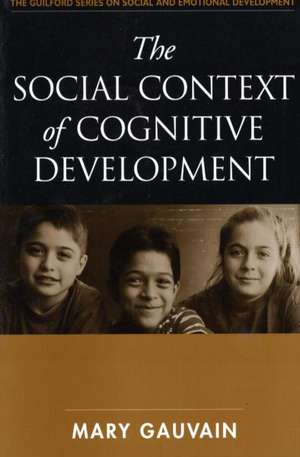The Social Context of Cognitive Development: Guilford Series on Social and Emotional Development
Autor Mary Gauvainen Limba Engleză Paperback – 21 dec 2000
Traditional approaches to cognitive development can tell us a great deal about the internal processes involved in learning. Sociocultural perspectives, on the other hand, provide valuable insights into the influences on learning of relationship and cultural variables. This volume provides a much-needed bridge between these disparate bodies of research, examining the specific processes through which children internalize the lessons learned in social contexts. The book reviews current findings on four specific domains of cognitive development--attention, memory, problem solving, and planning. The course of intellectual growth in each domain is described, and social factors that support or constrain it are identified. The focus throughout is on how family, peer, and community factors influence not only what a child learns, but also how learning occurs. Supporting her arguments with solid empirical data, the author convincingly shows how attention to sociocultural factors can productively complement more traditional avenues of investigation.
| Toate formatele și edițiile | Preț | Express |
|---|---|---|
| Paperback (1) | 271.80 lei 43-57 zile | |
| Guilford Publications – 21 dec 2000 | 271.80 lei 43-57 zile | |
| Hardback (1) | 584.48 lei 43-57 zile | |
| Guilford Publications – 21 dec 2000 | 584.48 lei 43-57 zile |
Preț: 271.80 lei
Preț vechi: 286.10 lei
-5% Nou
Puncte Express: 408
Preț estimativ în valută:
52.01€ • 54.45$ • 43.03£
52.01€ • 54.45$ • 43.03£
Carte tipărită la comandă
Livrare economică 07-21 aprilie
Preluare comenzi: 021 569.72.76
Specificații
ISBN-13: 9781572306103
ISBN-10: 1572306106
Pagini: 249
Dimensiuni: 152 x 229 x 18 mm
Greutate: 0.3 kg
Ediția:New.
Editura: Guilford Publications
Colecția Guilford Press
Seria Guilford Series on Social and Emotional Development
ISBN-10: 1572306106
Pagini: 249
Dimensiuni: 152 x 229 x 18 mm
Greutate: 0.3 kg
Ediția:New.
Editura: Guilford Publications
Colecția Guilford Press
Seria Guilford Series on Social and Emotional Development
Public țintă
Professional and Professional Practice & DevelopmentNotă biografică
Mary Gauvain, PhD, is Professor of Psychology at the University of California at Riverside. She received her master's degree in Sociology of Education from Stanford University and her doctoral degree in Developmental Psychology from the University of Utah. She is a fellow of the American Psychological Association and has served on the Executive Committee of the APA Division of Developmental Psychology. She is also a member of the Society for Research in Child Development. Her research on children's cognitive development in social and cultural contexts is widely published and has been funded by the National Institute of Child Health and Human Development and The Spencer Foundation, among others.
Cuprins
I. The Social Foundations of Cognitive Development
1. Introduction
2. Processes of Change: The How of Cognitive Development
3. The Sociocultural Context of Cognitive Development
II. The Development of Specific Higher Mental Functions in Social Context
4. Acquiring Knowledge: Intersubjectivity, Joint Attention, and Social Referencing
5. Remembering: The Social Construction of the Past
6. Solving and Learning to Solve Problems in Social Context
7. Constructing the Future: Planning in Social Context
8. Conclusions and Future Directions
1. Introduction
2. Processes of Change: The How of Cognitive Development
3. The Sociocultural Context of Cognitive Development
II. The Development of Specific Higher Mental Functions in Social Context
4. Acquiring Knowledge: Intersubjectivity, Joint Attention, and Social Referencing
5. Remembering: The Social Construction of the Past
6. Solving and Learning to Solve Problems in Social Context
7. Constructing the Future: Planning in Social Context
8. Conclusions and Future Directions
Recenzii
Mary Gauvain has an interesting and important theory about what causes developmental changes in children, and she sets it out in her new book convincingly and with great verve. Her theory is that the underlying factor that produces cognitive developmental change is social interaction, and she documents this claim with an impressively wide range of evidence. --Peter Bryant, PhD, FRS, Department of Experimental Psychology, University of Oxford
This is an outstanding summary of the social influences on children's thinking. Gauvain weaves cross-cultural and cognitive developmental research into a single tapestry that shows how children learn, remember, and solve problems in their everyday activities. She reviews major theories of cognitive development and uses activity theory as a framework to synthesize sociocognitive research. The book will be appreciated by students because it is coherent, readable, and up to date. --Scott Paris, PhD, Department of Psychology, University of Michigan
This book provides a valuable integration of literatures that point to the importance of social context as a mechanism of cognitive change. In examining the role of social influences in the development of attention, memory, problem solving, and planning, Gauvain manages to integrate social interactional accounts with other efforts to identify mechanisms of development, such as Piagetian and information-processing approaches. She reviews relevant research as well as incorporating memoirs of notable people to illustrate varying contexts of cognitive development. This book will be a valuable supplementary text for undergraduate and graduate courses in psychology, child development, and education. --Barbara Rogoff, PhD, Foundation Professor of Psychology, University of California, Santa Cruz
-This is an outstanding summary of the social influences on children's thinking. Gauvain weaves cross-cultural and cognitive developmental research into a single tapestry that shows how children learn, remember, and solve problems in their everyday activities. She reviews major theories of cognitive development and uses activity theory as a framework to synthesize sociocognitive research. The book will be appreciated by students because it is coherent, readable, and up to date. --Scott Paris, PhD, Department of Psychology, University of Michigan
This book provides a valuable integration of literatures that point to the importance of social context as a mechanism of cognitive change. In examining the role of social influences in the development of attention, memory, problem solving, and planning, Gauvain manages to integrate social interactional accounts with other efforts to identify mechanisms of development, such as Piagetian and information-processing approaches. She reviews relevant research as well as incorporating memoirs of notable people to illustrate varying contexts of cognitive development. This book will be a valuable supplementary text for undergraduate and graduate courses in psychology, child development, and education. --Barbara Rogoff, PhD, Foundation Professor of Psychology, University of California, Santa Cruz
Descriere
Traditional approaches to cognitive development can tell us a great deal about the internal processes involved in learning. Sociocultural perspectives, on the other hand, provide valuable insights into the influences on learning of relationship and cultural variables. This volume provides a much-needed bridge between these disparate bodies of research, examining the specific processes through which children internalize the lessons learned in social contexts. The book reviews current findings on four specific domains of cognitive development--attention, memory, problem solving, and planning. The course of intellectual growth in each domain is described, and social factors that support or constrain it are identified. The focus throughout is on how family, peer, and community factors influence not only what a child learns, but also how learning occurs. Supporting her arguments with solid empirical data, the author convincingly shows how attention to sociocultural factors can productively complement more traditional avenues of investigation.






